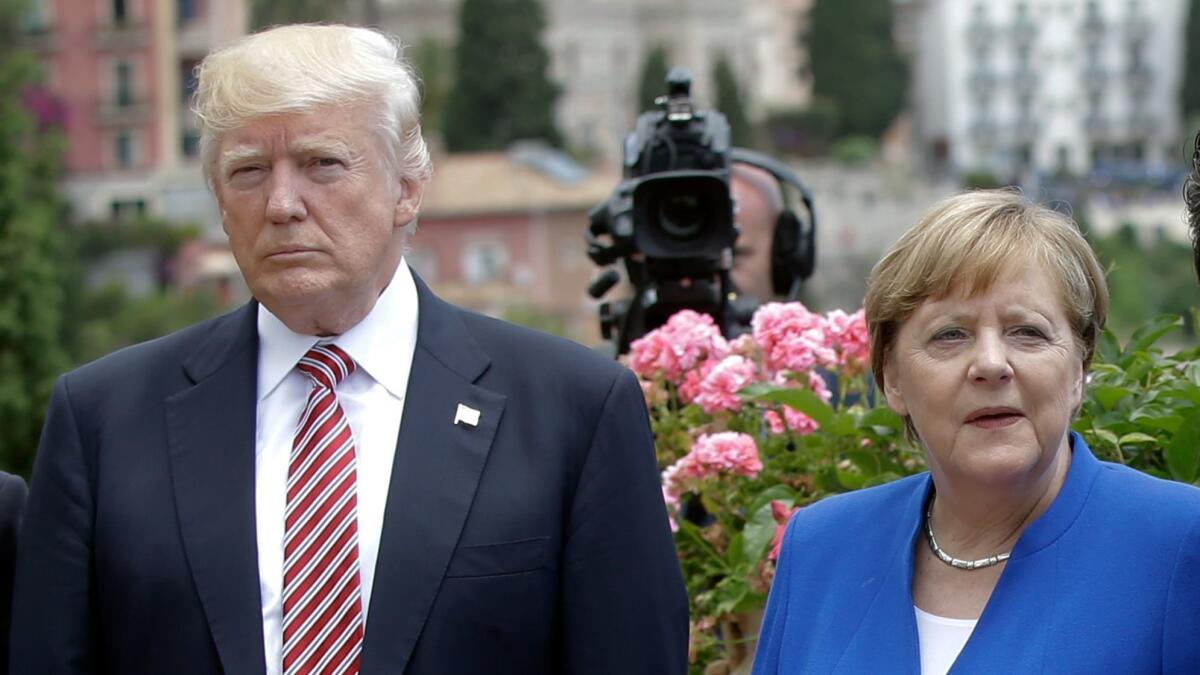Column: I spent my European vacation trying to explain Trump

If you’re planning a trip to Europe this summer, be forewarned: You may spend a lot of time explaining Donald Trump to the natives.
In our case, it started immediately, with the British immigration officer at London’s Heathrow Airport.
“Are you from the Southern states?” he asked. What he meant was: Are you Trump voters?
“What has gotten into you people?” he demanded. “You used to be a model other countries wanted to follow. Now we watch you and shake our heads.”
That was one of dozens of unsought conversations in three countries about the state of American politics. Europeans’ familiarity with the details of our national melodrama was sometimes startling.
“What’s the real story about Melania?” our British friend Naomi asked. “Is she moving into the White House or not?”
Europeans who once resented our superpower status now express sympathy for our troubles -- even nostalgia for American leadership.
“What about the famous son-in-law?” asked Lala, our Italian neighbor, amused to catch Americans practicing the kind of clan-based politics Italians know. “Is he the brains of the family?”
“If Trump is impeached, then Pence becomes president, right?” asked Liliane, a German lawyer. “Would he be worse?”
Brits, Italians and Germans all asked whether Trump’s presidency would be over by the end of the year. I described the complexities of impeachment, and how unlikely it was that a Republican-controlled Congress would go there. I reminded them of Italy’s Silvio Berlusconi, who won three elections and governed for nine years despite prosecutors’ efforts to bring him down.
Our European friends’ absorption in all things Trump goes beyond mere gossip, of course. They have gnawing concerns about an increasingly disorderly world — one in which the president of the United States, instead of bolstering stability, often seems to be a disruptor.
It wasn’t a scientific sample by any stretch. But our conversations mirrored a Pew global survey released last week which found that Trump is unpopular across much of the world and that his unpredictability has shaken confidence in the United States.
For half a century, Europeans got used to thinking of the United States as a stable cornerstone of world politics — not always sophisticated in their eyes, not always right, but reliably there. Now that we’re less reliable, they’re more nervous. “If the United States is making the world less stable instead of more stable, we’re all in deep ….,” Lala’s husband Carlo said in fluent American.
They know all too well that Europe — politically divided, militarily weak and economically listless — can’t fill the empty role of the missing superpower.
“Europe could be strong if countries knew how to work together, but they don’t,” said Peter, a German yoga instructor. “Nationalism gets in the way.”
Trump may have had one positive effect on continental politics, as Europe’s wave of nationalist populism appears to have ebbed. Trump-style anti-immigrant populists lost ground in three major elections this year: the Netherlands in March, France in May and Britain in June. In France, Trump virtually endorsed populist candidate Marine LePen; she was trounced by the Obama-style Emmanuel Macron.
“We have learned from your example,” Liliane joked.
There may be a silver lining for Americans too. Europeans who once resented our superpower status now express sympathy for our troubles — even nostalgia for American leadership.
Many Europeans condemned George W. Bush for invading Iraq. Then they pouted when Barack Obama, whom they liked better, made it clear he was more interested in Asia. Now they see a president who thinks alliances are a scam and doesn’t put much stock in the U.S. treaty commitment to defend Europe.
Europeans have plenty of reasons to worry about their future. Islamist terrorism has accelerated with attacks in England, France and Belgium. The European Union is in danger of falling apart. Russia is meddling in their elections and corrupting some of their governments. They still haven’t solved their massive unemployment problem.
In earlier times of trouble, American presidents stepped in with reassurances that the United States wanted a Europe that was prosperous, strong and united. Trump says, instead, that he sees Europe as a competitor, not an ally, and that he prefers his competitors to be weak, poor and disunited.
Italian columnist Beppe Severgnini recently compared Trump’s America to a straying husband, but suggested that he’d come home.
“Go ahead, have your affairs,” he wrote. “But don’t forget: You’re married to us.”
Perhaps he had forgotten that Trump is already on marriage No. 3 — and that he views wedding vows and treaties as open to renegotiation, just like real estate contracts.
Most Americans don’t pay nearly as much attention to European politics as my Italian, British and German friends pay to ours. There are too many countries, too many elections. And the details of European economic integration are mind-numbing.
But perhaps we should listen more closely to our European friends.
They’ve noticed that, under Trump, an important alliance — one that has kept their continent peaceful for 70 years — is in danger of slipping away through neglect. They see what they’re losing, and they’re worried. Shouldn’t we be too?
Twitter: @DoyleMcManus
Follow the Opinion section on Twitter @latimesopinion or Facebook
ALSO
Doyle McManus: Trump is neither feared nor loved
Opinion: A Chief Justice John Roberts Jr. speech that should make Trump’s ears burn
More to Read
A cure for the common opinion
Get thought-provoking perspectives with our weekly newsletter.
You may occasionally receive promotional content from the Los Angeles Times.











